directed by David Lean
written by Noël Coward
[after the play Still Life by Noël Coward (1936); adaptation by David Lean, Ronald Neame and Anthony Havelock-Allan]
2000: 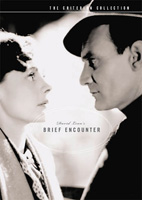 2012:
2012: 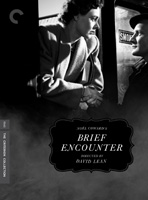
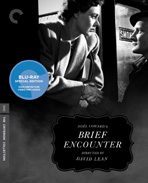
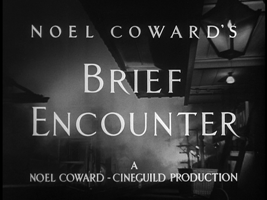
Criterion #76.
I’ve been waiting for a writerly mood to strike before addressing this one, but after a week of holding out, the mood is still in hibernation and I want to move on, so we’re just gonna make do with the mood I’ve got, which I would describe as “menial.”
There were some lines in the Criterion essay about how this film became
an object of derision in the ’60s… One critic defined the message of Brief Encounter as “Make tea, not love,” and recalled how an art-house audience in 1965 jeered at Alec and Laura’s middle-class torments.
I’m also familiar with the Nichols & May parody, the implication of which is, of course, that the film and its characters are absurdly straitlaced and repressed and, in a word, British. Britishness isn’t actually a subject of the movie, but obviously it underlies every aspect of the production, so it makes an easy scapegoat for the emotional problem the story poses. In the skit, Mike Nichols tosses out that he “saw that you were English clear through” as though this is an exquisitely romantic line. (Yes, in context it’s also a joke about bad teeth.)
But pinning the characters’ problems on their silly 40s Britishness — i.e. on the one thing that sets us safely apart from them — is just a cheap and cowardly way of getting out from under the real issue. It’s a melodrama to be sure, but every melodrama is about something, and this one is about something much more universal than British issues or women’s issues or uptight Christian morality.
The movie is not actually about the constraints of a specific culture. It’s about everyone’s internal tension, between being in touch with oneself and being connected to other people. And it’s about the emotional disorientation one experiences when passing back and forth over that line.
Yes, on the surface it would seem to be a standard weepie about the noble sacrifice of marriage, but it’s worth noting that the audience’s tears aren’t wrung at any point during the ill-fated love affair; they come in only at the very end (spoiler warning, I guess), because that’s when the actual issue comes to the fore: that the protagonist’s world of feelings is “a long way away” from the people around her. Rather than suggesting that this distance might ever be reduced, her husband thanks her sincerely for “coming back to me.” Neither of them can even conceive of him meeting her where she was — or for that matter, of anyone meeting her where she was, other than a magical stranger who is never fully met and known. The tears run because her world frames the need to abandon one’s inner romance not as a cold and cruel responsibility, but as love and welcome: if you give up the world of the self, then, and only then, can you truly come home. Oh Auntie Em.
I cried. Yeah, they got me. But mostly who got me was Rachmaninoff.
Serge Rachmaninoff is communicating through music that he, for one, has been where she was, a long way away. Not to mention Eileen Joyce and Muir Matheson performing it; they know about that place too. And then not to mention Noël Coward and David Lean, and the public that embraces such a movie as this — or even that embraces “Flames of Passion,” the phony movie within the movie. The fact is, there’s ample evidence that one’s fellow man is just as emotional and romantic and familiar with that faraway place Laura goes to. And yet still we do not trust one another; we are fearfully reluctant to make plans to meet there and live there. We would rather laugh at the stupid old-school Brits for being so nervous about sex, as though that’s the problem. It’s not.
The beautiful thing about Brief Encounter, what makes it stand out among so many thousands of love-that-cannot-be movies, is that it pares the psychodrama of infidelity down to its barest essentials, so much so that one glimpses the disturbing truth: that infidelity is not actually about sexual ethics, or even interpersonal relationships, at all. It is about fear of the nature of emotions, plain and simple.
Emotions are involuntary, not willed, so vowing “to love and to cherish” is overstepping the bounds of what one has the power to vow. Having stood in front of one’s community and made this solemn promise to ensure that there are clear skies every day, one can only live in fear of the day that it will happen to rain and one will be found out as a liar. Brief Encounter is about the tantalizing relief of coming clean about one’s true nature, as a being of emotions with a piano concerto rippling in one’s heart. Is such a being anti-social? In a certain frightening sense, yes. Frightening at least to society.
Movies, and the act of movie-watching, hover in a shadowy space between being social and being alone with one’s heart. We feel the sting in this movie because as we watch it, we’re in the same zone as the character, letting images drift between us and the world. Is this dangerous? What will all those society busybodies think of us when they realize we were rooting for a woman to cheat on her husband for no reason at all?
It’s really a remarkably daring movie for its time in that it does nothing to get us “on side.” There is no cinemoral logic to excuse the infidelity: the husband does nothing wrong; the wife suffers no great injustice. She is simply a person with feelings.
So was Noël Coward really writing about being gay? I don’t know; maybe. Ultimately it comes to the same thing. Accepting the world of your actual feelings is hard for everyone. In some ways, homosexuals have a relatively easy task of self-acceptance, because sex is a game played in private, where the waters of authenticity can be tested one like-minded person at a time. And even that is terrifying. Whereas embracing not-yet-validated feelings truly alone, running counter to even one’s spouse, is overwhelming. It’s no less true for us now than it was for Brits then. In fact I tend to think it’s actually worse. The impulse to scoff and parody just shows that the repression has gotten even fiercer. The derision is a gauge of how risky it is to let go; the derision is the risk.
It seems to me not coincidental that Rachmaninoff’s Piano Concerto No. 2, which serves as this movie’s landscape of the true inner life, the unlocked world of feeling, was famously written under hypnotic suggestion. Rachmaninoff’s hypnotic prompt was: “You will begin to write your concerto. You will work with the greatest of ease. The concerto will be of excellent quality.” I’ve always felt that the almost unparalleled emotional fluency of this particular piece, which has made it justly beloved, emanates from a purity of access to the emotional self that was made possible only through trance. The music quite literally comes to us from that world “a long way away” inside Rachmaninoff, who had gone into hypnotherapy after being paralyzed with anxiety by bad reviews.
Its melodies have the marvelous quality of always surging and at the same time always subsiding — the music inhales and exhales. It’s the exhaling that makes it feel so rare and strong and sensual. I suppose in some ways the same goes for this movie: it breathes in melodrama and then breathes it back out, and that’s when it starts to feel special.
Yes, I’ll admit I smirked when he said “You know what’s happened, don’t you?” and the script lurched rather unconvincingly to a higher pitch. But it was only after that point that the movie was able to reveal itself for what it really was — something deeper and more troubling than the standard middle-class infidelity melodrama it had seemed to be — so in retrospect I’m glad it went there.
It’s not realism. They’re allowed to say dramatic things to one another if they must.
David Lean’s Summertime (1955) (Criterion #22) was very closely related, I see in retrospect. But the light hits it at a different angle. That feels to me like a more fundamentally optimistic film, even though it has such a similar psychological substance. At least as I remember it.
The more recent covers at the top of this page are from the 4-disc boxset “David Lean directs Noël Coward,” which itself is spine #603, but within which Brief Encounter maintains its original spine number. That edition has a new restoration of the film and includes two documentaries. I however watched the original standalone edition, which is now out of print, because that’s what was at the library and I didn’t know any better until just now when I started putting this entry together. Oh well.
The disc I watched had only the commentary from Bruce Eder, another holdover from laserdisc days when the art of the commentary was still primitive. I watched about 20 minutes and then stopped it. I decided I’m allowed. He wasn’t offering anything of real interest, and it felt like suffering through his passionless, uninspired scholasticism was eroding the actual emotional experience I’d had.
There’s nothing actually wrong with it; it just serves no real purpose.
Connection to the preceding: A flurry of classical music as someone is seen running in the rain.
Or, you know, a man crosses a social boundary by making a melodramatic protestation of love. Yeah, that’s pretty standard stuff; it’s like saying “there’s a car in both movies.” But they were pretty similar stories on that level: a doomed romance forces the protagonist to confront truths about him/herself.
Here’s the Main Title: an extract — as is all the music in the movie — from Rachmaninoff’s Piano Concerto No. 2, Eileen Joyce with the National Symphony Orchestra conducted by Muir Matheson. This is of course the opening of the first movement. I think I’m not imagining things in taking this as a microcosm of the movie — a encounter with romance in the brief space between two passing trains, the second of which mercilessly blots it out in the middle of a phrase.
Finding these images of unpeopled space to end the entries has turned out to be an unexpectedly interesting task, because it brings me in contact with the fine points of the editor’s craft. Shots that seem promising, that on first glance seem to start or end with empty rooms susceptible to freeze-framing, on closer inspection turn out actually to start with the character’s leg already inside the frame and moving. The impact of even a single pair of frames of motionless uninhabited space is, it turns out, real and subliminally disruptive, and many editors are very careful to avoid it. Others accept it and embrace the slightly alienating effect.
In the case of this movie I chased the editor (Jack Harris) up and down the whole DVD and could only find a handful of frames without people in them, none of which was ideal for my purposes. This one, with only an impending shadow, is the closest thing I could find. I could have used subsequent frames to eliminate the shadow with Photoshop, but that’s not an option within the game I’m playing.
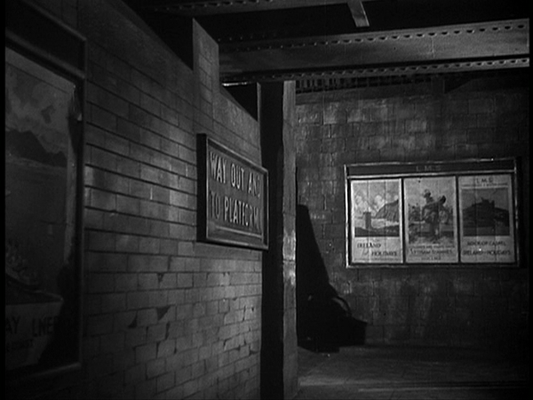
Thank you.